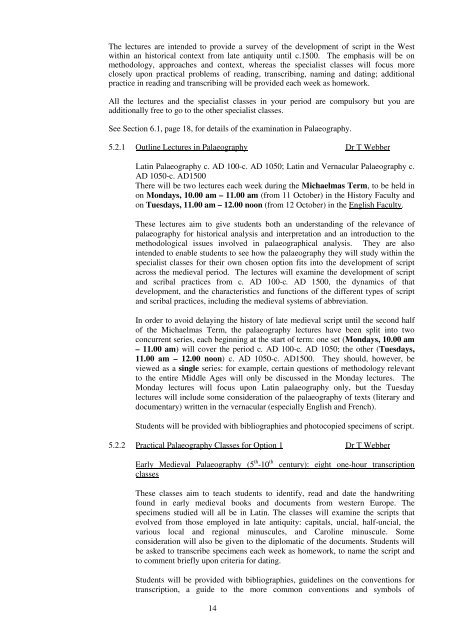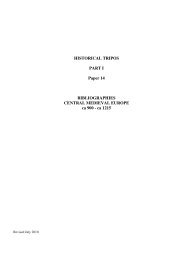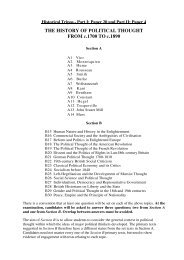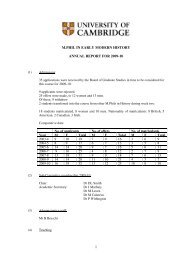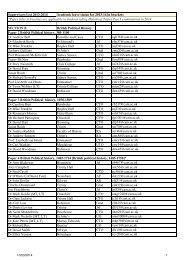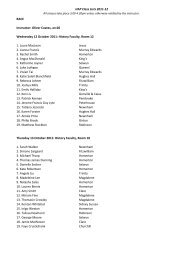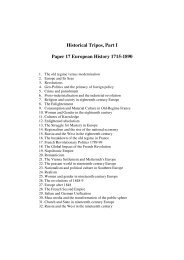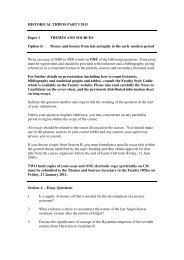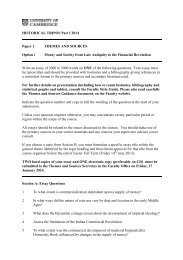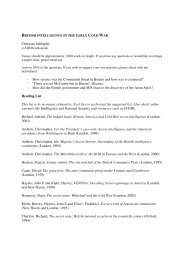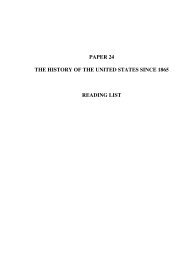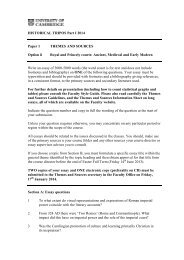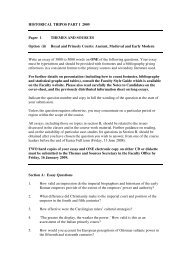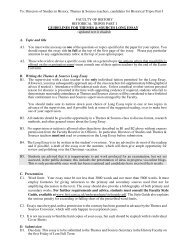Course Handbook - Faculty of History
Course Handbook - Faculty of History
Course Handbook - Faculty of History
Create successful ePaper yourself
Turn your PDF publications into a flip-book with our unique Google optimized e-Paper software.
The lectures are intended to provide a survey <strong>of</strong> the development <strong>of</strong> script in the West<br />
within an historical context from late antiquity until c.1500. The emphasis will be on<br />
methodology, approaches and context, whereas the specialist classes will focus more<br />
closely upon practical problems <strong>of</strong> reading, transcribing, naming and dating; additional<br />
practice in reading and transcribing will be provided each week as homework.<br />
All the lectures and the specialist classes in your period are compulsory but you are<br />
additionally free to go to the other specialist classes.<br />
See Section 6.1, page 18, for details <strong>of</strong> the examination in Palaeography.<br />
5.2.1 Outline Lectures in Palaeography Dr T Webber<br />
Latin Palaeography c. AD 100-c. AD 1050; Latin and Vernacular Palaeography c.<br />
AD 1050-c. AD1500<br />
There will be two lectures each week during the Michaelmas Term, to be held in<br />
on Mondays, 10.00 am – 11.00 am (from 11 October) in the <strong>History</strong> <strong>Faculty</strong> and<br />
on Tuesdays, 11.00 am – 12.00 noon (from 12 October) in the English <strong>Faculty</strong>.<br />
These lectures aim to give students both an understanding <strong>of</strong> the relevance <strong>of</strong><br />
palaeography for historical analysis and interpretation and an introduction to the<br />
methodological issues involved in palaeographical analysis. They are also<br />
intended to enable students to see how the palaeography they will study within the<br />
specialist classes for their own chosen option fits into the development <strong>of</strong> script<br />
across the medieval period. The lectures will examine the development <strong>of</strong> script<br />
and scribal practices from c. AD 100-c. AD 1500, the dynamics <strong>of</strong> that<br />
development, and the characteristics and functions <strong>of</strong> the different types <strong>of</strong> script<br />
and scribal practices, including the medieval systems <strong>of</strong> abbreviation.<br />
In order to avoid delaying the history <strong>of</strong> late medieval script until the second half<br />
<strong>of</strong> the Michaelmas Term, the palaeography lectures have been split into two<br />
concurrent series, each beginning at the start <strong>of</strong> term: one set (Mondays, 10.00 am<br />
– 11.00 am) will cover the period c. AD 100-c. AD 1050; the other (Tuesdays,<br />
11.00 am – 12.00 noon) c. AD 1050-c. AD1500. They should, however, be<br />
viewed as a single series: for example, certain questions <strong>of</strong> methodology relevant<br />
to the entire Middle Ages will only be discussed in the Monday lectures. The<br />
Monday lectures will focus upon Latin palaeography only, but the Tuesday<br />
lectures will include some consideration <strong>of</strong> the palaeography <strong>of</strong> texts (literary and<br />
documentary) written in the vernacular (especially English and French).<br />
Students will be provided with bibliographies and photocopied specimens <strong>of</strong> script.<br />
5.2.2 Practical Palaeography Classes for Option 1 Dr T Webber<br />
Early Medieval Palaeography (5 th -10 th<br />
classes<br />
century): eight one-hour transcription<br />
These classes aim to teach students to identify, read and date the handwriting<br />
found in early medieval books and documents from western Europe. The<br />
specimens studied will all be in Latin. The classes will examine the scripts that<br />
evolved from those employed in late antiquity: capitals, uncial, half-uncial, the<br />
various local and regional minuscules, and Caroline minuscule. Some<br />
consideration will also be given to the diplomatic <strong>of</strong> the documents. Students will<br />
be asked to transcribe specimens each week as homework, to name the script and<br />
to comment briefly upon criteria for dating.<br />
Students will be provided with bibliographies, guidelines on the conventions for<br />
transcription, a guide to the more common conventions and symbols <strong>of</strong><br />
14


